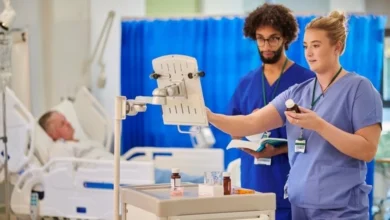What to Expect at your Gastroenterologist Appointment

You can anticipate a comprehensive evaluation of your digestive health at your upcoming gastroenterologist appointment. The appointment will likely involve various assessments and discussions with the gastroenterologist to understand and address your gastrointestinal concerns. This article will delve into what you can expect during a gastroenterologist appointment.
Introduction to Gastroenterology:
Gastroenterology is a medical specialty that focuses on the digestive system, encompassing organs such as the esophagus, stomach, liver, gallbladder, pancreas, small intestine, and large intestine. Gastroenterologists are highly trained physicians who diagnose and treat various gastrointestinal conditions.
Scheduling Your Appointment:
Before you visit a gastroenterologist, you will likely need to schedule an appointment. It ensures you receive the dedicated time and attention necessary to evaluate your digestive health thoroughly. Contact the medical facility or practitioner’s office to arrange a convenient date and time, providing an opportunity to address concerns and streamline the diagnostic process during your upcoming visit.
Arriving at the Clinic:
On arriving at the clinic for your appointment, you must bring all relevant medical records, such as previous test results, medications, and a list of symptoms you’ve been experiencing. This information will assist the gastroenterologist in understanding your medical history and tailoring their approach to your specific concerns.
Check-in and Administrative Procedures:
The initial steps involve checking in at the reception desk. The administrative staff will likely ask you to complete some paperwork, including your personal information, medical history, and insurance details. This step is crucial for maintaining accurate and up-to-date records and ensuring the best possible care during your visit.
Meeting with the Gastroenterologist:
Once the administrative tasks are complete, you will be called into the examination room to meet with the gastroenterologist. During this initial consultation, the gastroenterologist will ask you about your symptoms, medical history, lifestyle factors, and any family history of gastrointestinal issues. This detailed information will help them formulate an understanding of your overall health and potential risk factors.
Physical Examination:
After discussing your medical history, the gastroenterologist may conduct a physical examination. This may involve palpating the abdomen and checking for any signs of tenderness, swelling, or abnormalities. The physical examination is a crucial step in assessing the current state of your digestive health and may provide additional insights into potential issues.
Discussion of Symptoms and Concerns:
The gastroenterologist will delve into a detailed discussion about the specific symptoms or concerns that prompted your visit. This could include abdominal pain, changes in bowel habits, heartburn, nausea, or any other gastrointestinal symptoms. Open communication about your symptoms is vital for an accurate diagnosis and appropriate treatment recommendations.
Diagnostic Tests and Procedures:
The gastroenterologist may recommend further diagnostic tests or procedures depending on your symptoms and the initial assessment. These tests include a variety of endoscopic procedures, such as upper endoscopy (esophagogastroduodenoscopy or EGD) and colonoscopy. These procedures allow the gastroenterologist to visually inspect the digestive tract and obtain tissue samples for further analysis.
Upper Endoscopy (EGD):
An upper endoscopy involves the insertion of a thin, flexible tube with a light and camera at the end (endoscope) through the mouth into the esophagus, stomach, and the beginning of the small intestine. This procedure is valuable for evaluating conditions such as acid reflux, ulcers, and inflammation in the upper digestive tract.
Colonoscopy:
A colonoscopy is a procedure used to examine the large intestine (colon) and rectum. During this procedure, an endoscope is inserted through the anus to visualize the colon’s interior. Colonoscopies are crucial for detecting conditions such as colorectal cancer, polyps, and inflammatory bowel diseases like Crohn’s disease and ulcerative colitis.
Biopsy and Pathology Evaluation:
If abnormalities are detected during an endoscopy, the gastroenterologist may perform a biopsy, which involves taking small tissue samples for further analysis. These samples are sent to a pathology laboratory, and the results help confirm or rule out specific gastrointestinal conditions.
Discussion of Diagnosis and Treatment Options:
Once the diagnostic tests are complete, the gastroenterologist will discuss the findings with you. If a specific gastrointestinal condition is identified, the gastroenterologist will explain the diagnosis, its implications, and potential treatment options.
Follow-up Plan:
The gastroenterologist will outline a follow-up schedule based on the diagnosis and treatment plan. Follow-up appointments may be necessary to monitor your progress, adjust medications, or discuss any changes in symptoms. Regular follow-ups are crucial for managing chronic conditions and ensuring optimal digestive health.
Patient Education:
The gastroenterologist will likely provide information about your condition, treatment options, and lifestyle modifications throughout the appointment. Patient education is essential to managing gastrointestinal health, empowering you to make informed decisions about your well-being.
Insurance and Billing:
Before concluding your appointment, the administrative staff will assist you with insurance and billing matters. Understanding your insurance coverage and any out-of-pocket expenses associated with the visit is essential. The clinics often work with various insurance providers, but confirming the details beforehand is advisable.
Conclusion:
In summary, a gastroenterologist appointment, especially at Canadian Place Endoscopy in Toronto, is a comprehensive process designed to assess and address your digestive health concerns. From the initial consultation to diagnostic tests and potential procedures, the gastroenterologist and their team provide personalized care. By actively participating in the process, maintaining open communication, and following the recommended treatment plan, you can work towards optimal digestive health under the guidance of an experienced endoscopist in Toronto.




